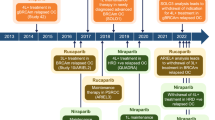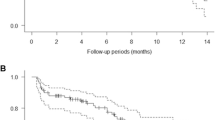Abstract
We retrospectively analyzed metastatic renal cell carcinoma (RCC) patients treated with 3 targeted agents. Patients started the sequence with a tyrosine kinase inhibitor (TKI), sunitinib or sorafenib, and were divided into 2 groups based on the order in which they received the other reciprocal TKI and everolimus (EVE): TKI–TKI–EVE group (n = 19) and TKI–EVE–TKI group (n = 14). Median progression-free survival (PFS) with first TKI was 13 months in the TKI–TKI–EVE group and 10 months in the TKI–EVE–TKI group. PFS with the second agent showed a trend in favor of the TKI–TKI–EVE sequence, with a median of 11 versus 6.5 months, whereas median PFS with the third agent was 6 months in both groups. Total PFS also showed a trend in favor of the TKI–TKI–EVE sequence with a median of 31 versus 23 months. Median overall survival (OS) was 38 months in both groups, with more patients receiving subsequent treatment in the TKI–EVE–TKI group. The subgroup of patients no long-term responders (≤9 months) to first TKI showed similar outcomes irrespective of the sequence. The subgroup of long-term responders to first TKI (>9 months) who received the other TKI instead of EVE had better outcomes in terms of median PFS with the second agent (13 vs. 5.5 months; p = 0.0271), median total PFS (39.5 vs. 23.5 months; p = 0.0415), and median OS (46 vs. 38 months). In conclusion, no apparent advantage was observed with early use of EVE in advanced RCC, even in those patients who did not benefit long from first-line TKI, whereas long-term duration of first-line TKI seems to be predictor of second-line TKI efficacy.




Similar content being viewed by others
References
Bracarda S, Bellmunt J, Melichar B, Negrier S, Bajetta E, Ravaud A, et al. Overall survival in patients with metastatic renal cell carcinoma initially treated with bevacizumab plus interferon-α2a and subsequent therapy with tyrosine kinase inhibitors: a retrospective analysis of the phase III AVOREN trial. BJU Int. 2011;107(2):214–9.
Coppin C, Porzsolt F, Autenrieth M, Kumpf J, Coldman A, Wilt T. Immunotherapy for advanced renal cell cancer. Cochrane Database Syst Rev. 2004;(3):CD001425. doi:10.1002/14651858.CD001425.pub2.
Elaidi R-T. What is the best option for second line in long responders to the first-line TKI in metastatic renal cell carcinoma patients: TKI–TKI or TKI-mTORi? 2012; ASCO GU (abstract 375). San Francisco US.
Vickers MM, Choueiri TK, Rogers M, Percy A, Finch D, Zama I, et al. Clinical outcome in metastatic renal cell carcinoma patients after failure of initial vascular endothelial growth factor-targeted therapy. Urology. 2010;76(2):430–4.
Escudier B, Szczylik C, Porta C, Gore M. Treatment selection in metastatic renal cell carcinoma: expert consensus. Nat Rev Clin Oncol. 2012;9(6):327–37.
Stenner F, Chastonay R, Liewen H, Haile SR, Cathomas R, Rothermundt C, et al. A pooled analysis of sequential therapies with sorafenib and sunitinib in metastatic renal cell carcinoma. Oncology. 2012;82(6):333–40.
Calvani N, Morelli F, Leo S, Orlando L, Lombardi L, Gnoni A, et al. Sequential use of sorafenib and sunitinib in advanced renal cell carcinoma: does the order of sequencing matter? Med Oncol. 2012;29(3):1908–13.
Wang S, Ivanova J, Antras L, Chang E, Ramamurthy P, Whittemore S. Safety and treatment patterns of angiogenesis inhibitors in patients with metastatic renal cell carcinoma: evidence from US community oncology clinics. Eur J Cancer Suppl. 2009;7(2; abstract 7143):436.
Eichelberg C, Heuer R, Chun FK, Hinrichs K, Zacharias M, Huland H, et al. Sequential use of the tyrosine kinase inhibitors sorafenib and sunitinib in metastatic renal cell carcinoma: a retrospective outcome analysis. Eur Urol. 2008;54(6):1373–8.
Michel MS, Vervenne W, Goebell PJ, Fisher Von Weikersthal L, Freier W, De Santis M. Phase III randomized sequential open-label study to evaluate efficacy and safety of sorafenib followed by sunitinib versus sunitinib followed by sorafenib in patients with advanced/metastatic renal cell carcinoma without prior systemic therapy (SWITCH Study): safety interim analysis results. J Clin Oncol. 2012;30(suppl):abstract 4539.
Rini BI, Escudier B, Tomczak P, Kaprin A, Szczylik C, Hutson TE, et al. Comparative effectiveness of axitinib versus sorafenib in advanced renal cell carcinoma (AXIS): a randomised phase 3 trial. Lancet. 2011;378(9807):1931–9.
Hutson T, Escudier B, Bjarnason GA, Lim HY, Pittman K, Senico P. Temsirolimus versus sorafenib as second line therapy in metastatic renal cell carcinoma: results from the INTORSECT trial. Ann Oncology. 2012;23(suppl 9):abstract LBA22_PR.
Knox JJ, Kay AC, Schiff E, Hollaender N, Rouyrre N, Ravaud A. First-line everolimus followed by second-line sunitinib versus the opposite treatment sequence in patients with metastatic renal cell carcinoma. J Clin Oncol. 2010;28(suppl; abstract TPS232):15s.
Motzer RJ, Escudier B, Oudard S, Hutson TE, Porta C, Bracarda S, et al. Phase 3 trial of everolimus for metastatic renal cell carcinoma: final results and analysis of prognostic factors. Cancer. 2010;116(18):4256–65.
Calvo E, Escudier B, Motzer RJ, Oudard S, Hutson TE, Porta C, et al. Everolimus in metastatic renal cell carcinoma: subgroup analysis of patients with 1 or 2 previous vascular endothelial growth factor receptor-tyrosine kinase inhibitor therapies enrolled in the phase III RECORD-1 study. Eur J Cancer. 2012;48(3):333–9.
Bergmann L, Goebell PJ, Kube U, Kindler M, Hermann E, Janssen J. Updated results of a prospective noninterventional study of everolimus after use of 1 VEGFR–TKI. J Clin Oncol. 2012;30(suppl):abstract e15044.
Heng DY, Mackenzie MJ, Vaishampayan UN, Bjarnason GA, Knox JJ, Tan MH, et al. Primary anti-vascular endothelial growth factor (VEGF)-refractory metastatic renal cell carcinoma: clinical characteristics, risk factors, and subsequent therapy. Ann Oncol. 2012;23(6):1549–55.
Bracarda S, Hutson TE, Porta C, Figlin RA, Calvo E, Grunwald V, et al. Everolimus in metastatic renal cell carcinoma patients intolerant to previous VEGFr–TKI therapy: a RECORD-1 subgroup analysis. Br J Cancer. 2012;106(9):1475–80.
Porta C, Paglino C, Imarisio I. Sequencing tyrosine kinase inhibitors or immediately switching to mTOR inhibitors in advanced kidney cancer: a critical review. Eur J Med Clin Oncol. 2011;2:67–72.
Procopio G, Verzoni E, Iacovelli R, Biasoni D, Testa I, Porcu L, et al. Prognostic factors for survival in patients with metastatic renal cell carcinoma treated with targeted therapies. Br J Cancer. 2012;107(8):1227–32.
Iacovelli R, Santoni M, Di Lorenzo G, Cerbone L, Aglietta M, Masini C. Progression free survival and overall survival in patients receiving 3 targeted therapies for metastatic renal cell carcinoma. Ann Oncol. 2012;23(suppl 9):abstract 818P.
Busch J, Seidel C, Erber B, Issever AS, Hinz S, Kempkensteffen C et al. Retrospective comparison of triple-sequence therapies in metastatic renal cell carcinoma. Eur Urol. 2012. doi:10.1016/j.eururo.2012.09.004.
Acknowledgments
The authors would like to thank Dragonfly Science (Dragonfly Limited, Wellington, New Zealand) for the language revision of the text.
Conflict of interest
None.
Author information
Authors and Affiliations
Corresponding author
Rights and permissions
About this article
Cite this article
Calvani, N., Morelli, F., Chiuri, V. et al. Prolonged exposure to tyrosine kinase inhibitors or early use of everolimus in metastatic renal cell carcinoma: are the two options alike?. Med Oncol 30, 578 (2013). https://doi.org/10.1007/s12032-013-0578-8
Received:
Accepted:
Published:
DOI: https://doi.org/10.1007/s12032-013-0578-8




